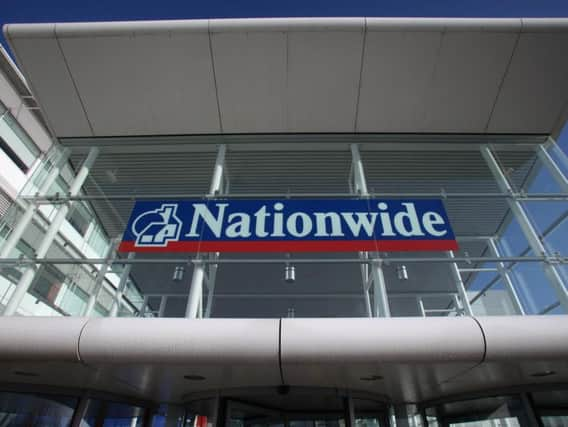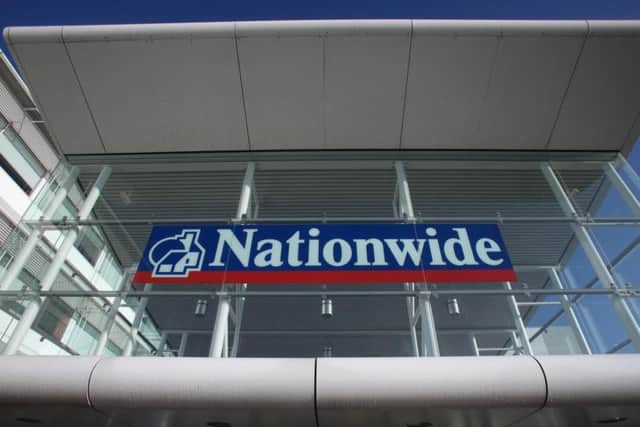Nationwide Building Society to charge 39.9% annual overdraft rate


Nationwide Building Society is making the changes as the Financial Conduct Authority (FCA) moves to clamp down on complex overdraft charging structures, with new rules requiring providers to show costs with a simple annual rate.
Nationwide has 7.9 million current account customers, not all of whom have an overdraft. Typically, each month, 800,000 Nationwide members will use an overdraft.
Advertisement
Hide AdAdvertisement
Hide AdNationwide said it is confident that its changes, which take effect from November 11, will set a new benchmark for simplicity and transparency.


It is removing all unarranged borrowing charges along with paid and unpaid transaction fees.
The new 39.9% rate will apply across its FlexDirect, FlexPlus and FlexAccount products.
Customers have been able to get a rate of 18.9% with Nationwide's FlexAccount.
Advertisement
Hide AdAdvertisement
Hide AdAround 30% of members are expected to see no change or a reduction in their borrowing cost.
Nationwide said that of its customers who will see their costs increase, most will see a rise of 20p per day or less.
A "small proportion" who borrow higher amounts more frequently will see a higher cost.
Nationwide will proactively contact them to explore alternative borrowing options.
Advertisement
Hide AdAdvertisement
Hide AdA £250 fee-free buffer which has been offered on FlexPlus will also be removed.
Nationwide said the cost to operate FlexPlus had become unsustainable.
Martin Lewis, founder of MoneySavingExpert.com, said: "On the surface, Nationwide's new standard overdraft rate is shocking.
"Its 39.9% APR is far more than a high street credit card - more even than the hideous rate that most store cards charge - and roughly similar to the rates charged for those with some of the worst credit scores, if they're accepted for plastic.
Advertisement
Hide AdAdvertisement
Hide Ad"Yet while this looks like a horridly expensive change by the country's biggest building society, in truth overdraft charges have been hideous for a long time.
"Nationwide currently charges 50p a day on major accounts, and per day charges - especially for those with smaller overdrafts - can have effective equivalent APRs higher even than the scourge that is payday loans.
"So the shock is more due to the fact the costs are now more transparent and easier to compare.
"And while Nationwide is just ahead of the pack in doing this, new rules by the regulator, the FCA, mean all overdraft providers will have to charge via APR - so comparisons will now be easier."
Advertisement
Hide AdAdvertisement
Hide AdNationwide's moves follow the FCA's wide-ranging high cost credit review.
The regulator recently confirmed plans to shake up the "dysfunctional" overdraft market - including stopping banks and building societies from charging higher prices for unarranged overdrafts than for arranged overdrafts.
The FCA expects the typical cost of borrowing £100 through an unarranged overdraft to fall from £5 a day to less than 20p a day.
Fixed fees for borrowing through an overdraft will also be banned.
Advertisement
Hide AdAdvertisement
Hide AdMore than 50% of banks' unarranged overdraft fees came from just 1.5% of customers in 2016.
The FCA previously said providers will be required to advertise arranged overdraft prices with an APR (annual percentage rate) to help customers shop around.
The changes will be in force by April 6 2020 - and had already prompted concerns that providers may hike authorised overdraft charges to claw back some revenue lost from unauthorised overdraft fees.
The FCA has said it will actively monitor market developments.
Advertisement
Hide AdAdvertisement
Hide AdIt has previously acknowledged some firms may look to increase their arranged overdraft prices and reduce interest-free buffers to recoup lost revenue from unarranged overdrafts.
But it argued the net effect will still be better for consumers - and increased competition between providers as a result of the changes will constrain any price increases.
Mr Lewis said Nationwide customers with smaller overdrafts who are currently being charged could find they gain.
He said: "Those with overdrafts over £450 to £550 will start to pay more, and substantially more for bigger overdrafts.
Advertisement
Hide AdAdvertisement
Hide Ad"If you're one of those people, it's worth looking at trying to pay down your overdraft if possible, or look at other options such as using a specialist money transfer credit card to shift the balance to 0% debt."